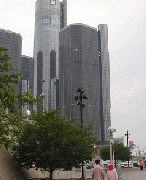
|
|
An Arab American couple walks along the Detroit riverfront. PHOTO: Khalil AlHajal/TAAN |
DETROIT — A field of 168 candidates running to serve on the nine-member Detroit City Council will be cut to 18 after August 4 primary elections.
Voters will make their final choices in the Nov. 3 general election.
In a city fighting to continue a stalled revitalization while facing a $300 million budget deficit and an ailing auto industry, the election is immensely important to residents.
But aside from six incumbents and a few vaguely recognizable names, the candidates have struggled to get exposure and distinguish themselves.
For a complete list of all the candidates and a more comprehensive review of their campaigns, including video interviews, visit mivote.org or publius.org.
At least two of the candidates are of Arab or Chaldean descent. Others have appealed specifically to Arab American voters.
Here is a small sampling:
Matthew Naimi
Naimi is campaigning as the “Green candidate” of the city council race.

|
|
Matthew Naimi |
A Chaldean American who lives in the Cass Corridor, Naimi has made green energy, mass transit and urban farming the pillars of his campaign.
He said his experience as a business owner and expertise in green initiatives give him the ability to help whittle away at the city’s budget deficit without cutting services.
“If I can look through [the budget] department by department and address inefficiencies by utilizing green energy… that’ll go a long way,” he said.
He said converting the city’s buses to energy-efficient hybrids could save the city $5 million to $7 million over ten years.
He’s also advocated trimming compensation and staffing allowances for city council members, building a high-speed rail system along major city routes to supplement the bus system and establishing a Detroit Department of Agriculture to bolster development of the city’s growing urban gardening movement.
He said the community he lives in has established a flourishing garden on vacant land that was once an eyesore at 2nd Avenue and West Willis Street.
Naimi, 36, was born in Detroit before his family moved to Bloomfield Hills in the 1970’s.
He moved back into the city in 1996 wanting to contribute to Detroit’s rejuvenation.
“I decided I wanted to be a part of the solution, rather than part of the problem,” he said. “I’ve seen a lot of development. When you look back, I’ve seen my area completely rejuvenated.”
Naimi believes his work at the grassroots level to help uplift his neighborhood, and at the government level to develop a major program, has prepared him to serve as an effective city council member.
“You have to be able to work with the system and with people in order to get anything done,” he said.
Mohamed Okdie
Okdie is a Vice Chairman of the Detroit Police Commission.
He’s a retired Detroit Public Schools social worker and a veteran of the U.S. Air Force.

|
|
Mohamed Okdie |
He currently serves on the Board of Regents at Eastern Michigan University, appointed by Gov. Jennifer Granholm in 2007.
“All of those boards and activities give me unique insight into decision making with regards to budgets and how these budgets affect peoples’ lives on a daily basis,” he said. “All that combined gives me a unique package of experiences specific to the city council job.”
Building bridges between Arab American and African American communities has been a major part of his campaign and career as an activist.
“If [Arab Americans] only knew how accommodating and how accepting the African American is to the Arabs and Muslims,” he said, “they would be beside themselves and be happy to say the stereotypes are not what they think they are. This is a wonderful community and people opened up their arms and thoughts to me and are being objective about Arab Americans.”
Okdie, 60, has advocated against cutting deeper into city services to address the budget deficit.
“Our city services are already cut to the bone by the previous administration. My desire is to look not necessarily at cutting city services or programs, but to get into them to be streamlined and to make them more efficient.”
U.S. Rep. John Conyers and the AFL-CIO have endorsed Okdie.
“I want to create a land bank in Detroit and organize continuous parcels of vacant property,” Okdie said, “as well as create renaissance zones for tax breaks for businesses… I think if we made those things available, we would develop jobs, broaden the tax base and increase and better city services… It will be a snowball effect… We’ll reduce crime and reduce unemployment.”
Michele Robinson
Robinson is an African American candidate who has reached out to the Arab American community.

|
|
Michele Robinson |
She said a spotless record over 10 years working in the city as an attorney, real estate agent and owner of a mortgage company shows her trustworthiness.
Revitalization of parks in the city is another major part of her campaign. She said Detroit has lost too many of its parks over time, costing neighborhoods in housing values, insurance rates and quality of life.
“That affects the youth, that affects the seniors — the two most forgotten segments of the population,” she said.
Robinson, 39, also boasts specific plans for reducing city costs without layoffs or pay cuts.
“There’s room to move in other areas,” she said.
She believes reincorporating the General Services Department, created in 2006, into the Recreation Department would increase efficiency and better services.
She also supports reducing the number of city council members from nine to seven, which she said could save the city as much as $1.5 million.
City council members earn $81,312 a year.
Visit mivote.org or publius.org for more information.






Leave a Reply